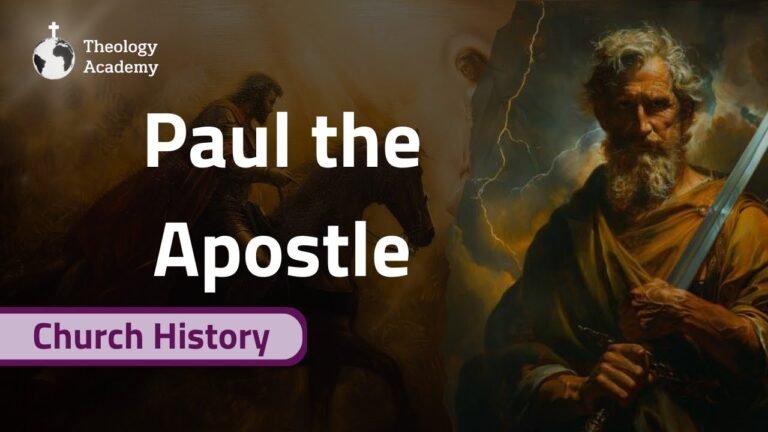The Life and Legacy of the Apostle Paul
Who was the Apostle Paul? A pivotal figure in early Christianity, Paul transformed from a persecutor of Christians to one of the faith’s most ardent advocates. His profound theological insights and extensive missionary journeys played a crítico role in spreading the teachings of Jesus across the Roman Empire. As the author of several New Testament letters, Paul’s writings continue to influence Christian thought and practice today, making him a central character in the history of the faith. Understanding his life and contributions offers valuable insights into the development of early Christian communities and the foundational beliefs that shaped the religion.
Who is Paul the Apostle and what were his contributions?
Paul the Apostle, originally known as Saul of Tarsus, emerged as a pivotal figure in the early Christian movement during the first century. Born around 5 AD, he was a highly educated Jew and a Roman citizen who initially persecuted Christians. However, a dramatic conversion experience on the road to Damascus transformed him into one of Christianity’s most fervent advocates, leading him to dedicate his life to spreading the teachings of Jesus Christ.
Throughout his ministry, Paul traveled extensively across the Roman Empire, establishing numerous Christian communities. He authored several letters, known as epistles, that addressed various theological issues and provided guidance to early believers. These writings not only shaped Christian doctrine but also emphasized the importance of faith, grace, and the inclusion of Gentiles into the faith, marking a significant departure from the Jewish roots of Christianity.
Paul’s influence on Christianity cannot be overstated; his teachings laid the foundation for much of Christian theology and practice. He played a crítico role in the transition of Christianity from a Jewish sect to a global faith, and his legacy continues to resonate throughout the centuries, inspiring countless individuals and movements within Christianity today.
What was Paul’s identity prior to his encounter with Jesus?
Before his transformative encounter with Jesus, Paul was known as Saul, a figure deeply entrenched in the Jewish faith as a fervent Pharisee. His zealous adherence to the law positioned him as a staunch opponent of the early Christians, whom he relentlessly persecuted in an effort to uphold what he believed to be the true interpretation of Judaism.
Saul’s commitment to his beliefs fueled a campaign against those he viewed as heretics, showcasing his intense dedication and fervor. However, this persecution would soon take a dramatic turn, leading to a profound conversion that would redefine his life’s mission and ultimately reshape the course of Christian history.
What is Paul’s significance in the Bible?
St. Paul holds a pivotal role in the foundation and spread of Christianity, second only to Jesus himself. As a former persecutor of Christians who had a transformative encounter on the road to Damascus, his journey illustrates the power of redemption and faith. This dramatic shift not only changed his life but also set the stage for his mission to spread the teachings of Christ throughout the Roman Empire.
His epistles, or letters, form a significant part of the New Testament and are essential for understanding early Christian theology. Through his writings, Paul addressed various issues faced by early Christians and provided insights into the nature of faith, grace, and salvation. His teachings on the relationship between God the Father and Jesus have shaped Christian beliefs and continue to resonate with believers today.
Moreover, Paul’s emphasis on the mystical relationship between humanity and the divine has had lasting implications for Christian spirituality. By articulating the idea that faith transcends cultural and social boundaries, he laid the groundwork for a universal church. His contributions not only helped establish Christian doctrine but also inspired countless individuals to explore their own spiritual journeys in connection with God.
Unraveling the Journey of Faith
Faith is a profound journey that transcends mere belief; it is an exploration of the soul that invites individuals to seek deeper understanding and connection with the divine. Each step along this path is marked by moments of introspection, doubt, and revelation, as we grapple with life’s complexities. Embracing faith encourages us to confront our fears and uncertainties, ultimately guiding us toward a greater sense of purpose and belonging. It becomes a source of strength, inspiring us to forge meaningful relationships and cultivate compassion in a world that often feels fragmented.
As we navigate this journey, we discover that faith is not a solitary endeavor but a communal experience that binds us together. Sharing our stories, struggles, and triumphs fosters a sense of unity and collective growth, allowing us to learn from one another’s experiences. This interconnectedness enriches our understanding of faith, revealing its transformative power. By welcoming diverse perspectives and embracing vulnerability, we create a vibrant tapestry of belief that encourages us to rise together, illuminating the path toward hope and renewal in our lives and communities.
The Transformative Impact of a Divine Mission
In a world often clouded by uncertainty and division, the pursuit of a divine mission can serve as a powerful catalyst for transformation. Individuals who embrace such a calling find themselves driven by a profound sense of purpose, igniting passion within themselves and inspiring those around them. This commitment to a higher purpose encourages the development of empathy, resilience, and collaboration, creating communities that thrive on shared values and collective aspirations. As they embark on this journey, they discover not only their own potential but also the strength that comes from unity in purpose.
The ripple effects of a divine mission extend far beyond the individual, touching lives in ways that can alter the course of entire communities. When people come together with a shared vision, they become agents of change, fostering an environment where innovation and compassion flourish. This collective effort often leads to transformative solutions for pressing social issues, breaking down barriers and bridging divides. Ultimately, the impact of a divine mission is a testament to the power of belief, reminding us that when hearts and minds align for a common good, the possibilities are limitless.
From Persecutor to Pioneer: A Remarkable Turn
In a world often defined by rigid roles, one individual’s journey from persecutor to pioneer challenges our understanding of redemption and transformation. Once a figure synonymous with oppression, this person underwent a profound metamorphosis, driven by a deep desire for atonement and a newfound commitment to justice. Embracing vulnerability, they confronted their past actions, seeking to understand the pain they once inflicted, and in doing so, opened the door to healing for both themselves and those they wronged.
This remarkable turn not only reshaped their own identity but also sparked a movement that inspired many. By advocating for marginalized voices and championing inclusive policies, they became a beacon of hope in a fractured community. Their story serves as a powerful reminder that change is possible, and that even the darkest past can lead to a brighter future when one is willing to take responsibility and make amends. Through dedication and empathy, this former persecutor has emerged as a pioneering force for positive change, proving that transformation is not just a dream, but a tangible reality.
Lessons from the Apostle’s Letters
The Apostle’s letters offer profound insights that resonate across time, providing valuable lessons in faith, community, and personal growth. Through his writings, we discover the importance of love as the foundation of all relationships, urging believers to support and uplift one another. The emphasis on unity within diversity serves as a timeless reminder that, despite our differences, we are all part of a greater purpose, encouraging us to embrace our unique gifts for the collective good.
Moreover, the letters challenge us to reflect on our personal journeys, emphasizing the transformative power of grace and redemption. The Apostle’s candid discussions about struggles, doubts, and perseverance invite us to confront our own challenges with courage and resilience. By fostering a spirit of humility and accountability, these teachings inspire us to strive for deeper connections with both our faith and our communities, ultimately guiding us toward a more fulfilling and purposeful life.
Enduring Influence on Christianity Today
The enduring influence of early Christianity is evident in the foundational teachings and practices that continue to shape modern faith. From the emphasis on love and compassion exemplified by Christ to the communal aspects of worship, these principles resonate deeply within contemporary Christian communities. The early church’s commitment to social justice and moral integrity has also inspired movements seeking to address inequality and promote peace in today’s world. As believers navigate the complexities of modern life, the core values established by their predecessors serve as a guiding light, reminding them of the transformative power of faith and the importance of living out their beliefs in everyday actions.
The Apostle Paul stands as a pivotal figure in the early Christian church, whose transformative journey from persecutor to proponent of faith reshaped the landscape of Christianity. His epistles not only provide insight into theological concepts but also offer timeless guidance on living a life of purpose and conviction. Understanding Paul’s profound impact invites us to reflect on the enduring power of redemption and the universal call to faith that transcends generations.







